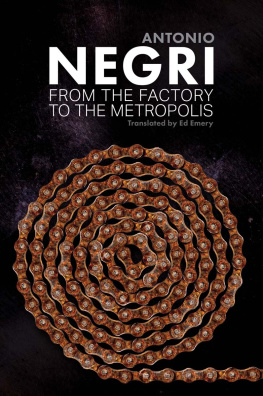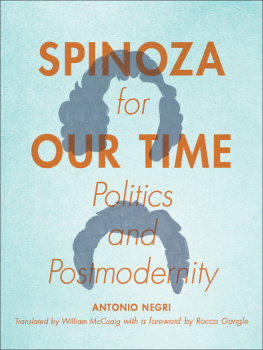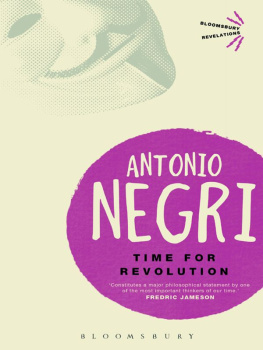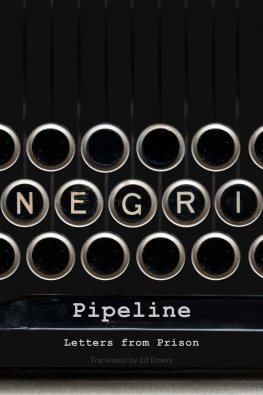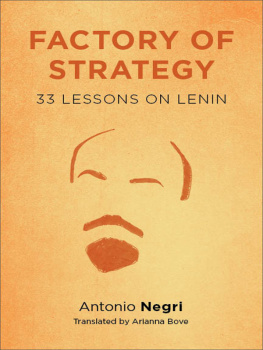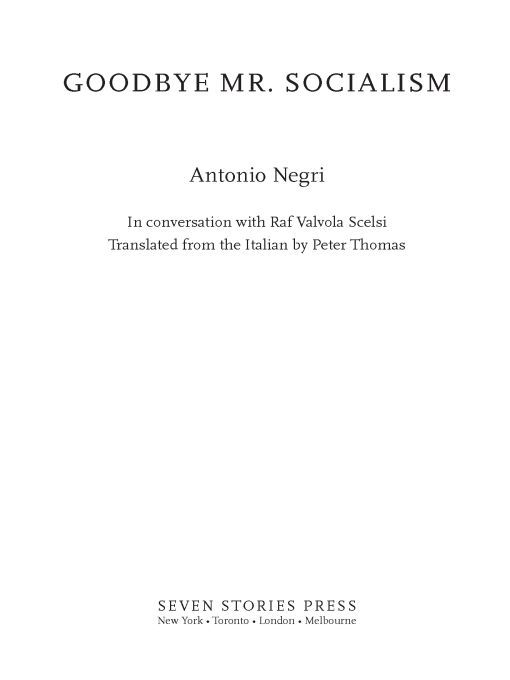Table of Contents

Ciao, Toni, how are you? Its been a long time.
Raf, youre still kicking around?
Yeah, you know, the bad never die. You also seem to be doing well...
Monsters stay beautiful; what causes them to lose their allure is the reality of Italian politics.
Why? What have you got against Berlusconi? Or are you still discouraged by the Left... ?
The Left? But who are they? They didnt even manage to defeat Berlusconi. Thats what we need, no?
This is precisely what I want to talk with you aboutabout how insipid the Left is.
Why not? Lets talk about it; Im also very concerned. This Berlusconi is a bully; he is pushing the pallid institutional representation of the Leftthat is, of the honest people who worktoward a nervous breakdown. If Parliament has never functioned well, it certainly wont function now. And now is when we need someone who decides, a decision maker... I have the feeling were about to witness again an old storyan exhausted democracy counterposed to an aggressive populism. The First Republic is finished, dishonorably. Still, even today it inspires some nostalgia... They were thieves, certainly, but they did not corrupt institutions as much as the current politicians and bosses do. The Second Republic stands for corruption, from any point of view you want to look at it; its neoliberal postmodernity founded on the privatization and appropriation of all public goods by private interests and on the perversion of public ethics.
And the precariat... ?
Yes, not only on the precaritization of living labor, but also on the basis of making the savings of workers more insecure, on increasing the misery of the pensioners. You know, it affects me, Im almost a pensioner... And then Berlusconi wins the electionshe doesnt lose them at any ratebased on the promise to abolish the inheritance tax. Its sheer madness, the hara-kiri of the miserable.
So you dont see a way out? You dont believe that the narrow victory of the Left still gives us a future?
Unfortunately, no. While in Italy the Second Republic languishes between the alternatives of a flabby and weak Left and a strong fascist, populist, Bushist Berlusconi and company, there has now developed around the world a democratic opposition that goes beyond socialism. Latin America is liberating itself from the yoke of North American dependence; guerrilla warfare in Iraq checkmates neoconservative American unilateralism; China and India are asserting themselves in a strong way on the world markets; the small amount of intelligence that still exists in European capitalism struggles for a Europe that takes its distance from Bush; and further, the great alternative globalization movement has found its social base in the struggles of the precariat and intellectual workers. The French struggles of the last months show this. What happens here in Italy, on the other hand? We are dealing with a Left immunized against any hope of renewal and neutralized, practically and theoretically, with respect to any subversive struggle.
1. GOODBYE MR. SOCIALISM
RAF VALVOLA SCELSI: Nineteen eighty-nine, the fall of the Berlin Wall, the end of real socialism. Why did it fall? What happened to all of us when it fell?
ANTONIO NEGRI: I remember those great celebrations, the crowd that went over the Wall and simultaneously demolished it. Here at home I have a numbered piece of the Wall that was given to me by an old friend, a theologian. The demolition of the Wall and passing through the Brandenburg Gates were really exciting from many points of view, whatever the conclusions that we can draw from them today.
To my mind, 1989 corresponds to 1968. While 1968 had broken down the walls that closed our society, 1989 broke down the wall that defended real socialism, keeping it outside the world market.
So, as I was saying, I saw these joyful people on television who came from the other side to buy themselves a pair of shoes. Fundamentally, they were miserable in the new consumerist ideology, but all of that was nothing compared to the true joy they felt upon exiting that totalitarian world in order to find a little freedom.
A week later, Claus Offe came to see me in Paris. He is one of the major theoreticians of capitalist development and of the organizational forms of labor in Germany after World War II; one of the people closest to me in terms of the type of analysis that I had developed around the theoretical axis of workerism and with whom I had collaborated on scholarly projects. He came to see me because I had invited him to one of my seminars. He was still extremely emotional. The evening that the Wall was falling, he left Hamburg and went to Berlin in his car with his little daughter. He told me about the immense joy of that adventure. It was enthusiasm not so much for German unification, a term that was proposed only much later on the political levelit was the joy that a border was eradicated, a ferocious and abstract limit sitting in our consciousness, inside a people, inside a civilization in the heart of Europe. Knowing the old divided Berlin, you know perfectly well what madness it was to cross the border inside the city, exactly like how today its crazy to pass through the gates of Jerusalem or jump over the walls that are being raised all over the place in order to defend ourselves from the exterior, from the migrants, from the barbarians. In any case, Claus and I drank quite a bit that night, completely happy that this gross and totalitarian socialism was finally finished.
Yesterday, but also today, we were left with the question of the historical development of that form of socialism. For my part, I certainly dont participate in that nostalgia expressed, for example, by the director Wolfgang Becker in his nevertheless excellent Good-Bye Lenin! but also by other widespread attitudes in East Germany, like in Poland and in other ex-socialist countries, not to speak of the old Soviet Union, where nostalgia is complicated by resentment and is accompanied by the rebirth of a strong nationalism.
Beyond these aspects (which, according to me at any rate, are superficial), we need to ask ourselves why a massively planned economy and a socialist society werent able to establish solid structures and to gain an enduring consensus.
SCELSI: What does a planned economy really mean?
NEGRI: I think it is important to emphasize that a planned economy is nevertheless a capitalist economy, that is, an economy for profit. Furthermore, a planned economy is always an economy in which the space for decision, though defined by public power, is managed by the enterprise. Personally, I lived in the West the dramas and the tension that many Western intellectuals have experienced with this type of problem. The best socialist minds of the West have grappled with the fundamentals of this problem (plan and profit, enterprise and development). That is, how do we determine (within a public decision by the State) the convergence of the interest of the enterprise and the cohesion, or the participation and the consensus, of the citizens-workers? Im not sure, but I have the impression that the fall of the Soviet system was due to many elements, among which, however, the nonsolution of this theme appears to be fundamental. This is what we have to ask ourselves. In reality, I dont believe at all that an economically planned regime must be structurally incapable of gaining the consent of its subjects. Great economists of the past, realists and formalists, from [Karl] Marx to [Lon] Walras, have demonstrated not only the possibility, but also the viability of making an economically planned regime. Excellent economists immediately prior to our generation, like [John Maynard] Keynes and [Joseph] Schumpeter, have shown the viability and opportunity of economically planned regimes. So dont worry: a planned economy is completely possible and (perhaps) opportune. Having said that, from the historical point of view, the problem is another one. In the USSR, in its very genesis, planning had to resist an ever-more-insupportable military pressure to support an ever-more-difficult and evident resistance, beginning with always more compressed consumption. Later, we should have thanked the Soviet multitude. Without their sacrifices, for example, the Nazis would have won the war and we would all speak German... But we didnt thank them. Rather, as soon as we were liberated from Nazism, we intensified the liberal hatred of them. Taking up the problem again from where we left itthat is, from the question of the planned economythe lack was not there but in the relations of force. The Soviet Union didnt survive, not because its existence was an impossible dream, but because the Western strategy of closure and repression and antihumanist hate won.






